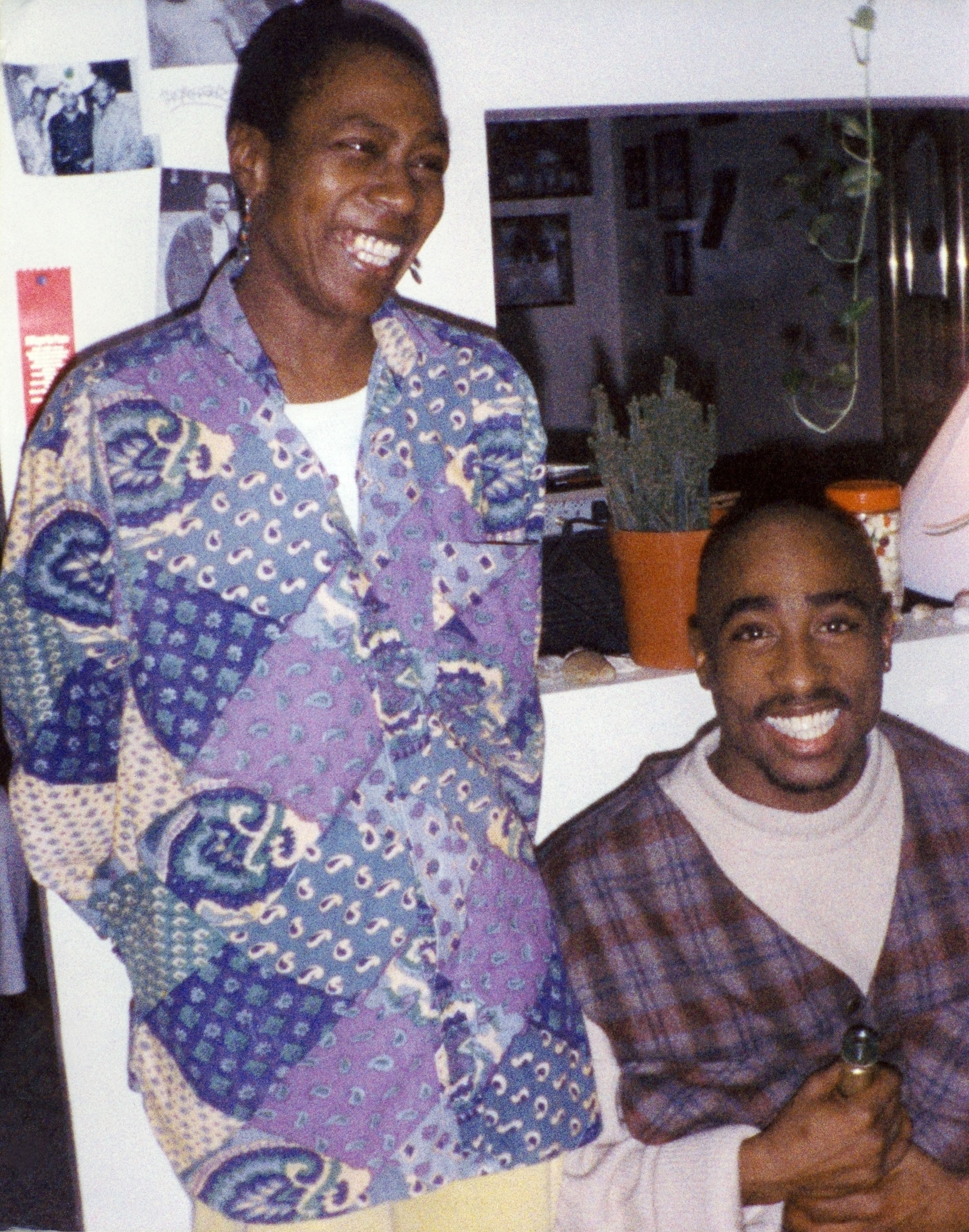‘He never stopped being hurt’: Tupac Shakur and the women who shaped him
Kevin E G Perry speaks to the rapper’s godfather Jamal Joseph and Staci Robinson, the author of the newly published ‘Tupac Shakur: The Authorized Biography’, about Shakur’s legacy and the guiding influence of his mother


Your support helps us to tell the story
From reproductive rights to climate change to Big Tech, The Independent is on the ground when the story is developing. Whether it's investigating the financials of Elon Musk's pro-Trump PAC or producing our latest documentary, 'The A Word', which shines a light on the American women fighting for reproductive rights, we know how important it is to parse out the facts from the messaging.
At such a critical moment in US history, we need reporters on the ground. Your donation allows us to keep sending journalists to speak to both sides of the story.
The Independent is trusted by Americans across the entire political spectrum. And unlike many other quality news outlets, we choose not to lock Americans out of our reporting and analysis with paywalls. We believe quality journalism should be available to everyone, paid for by those who can afford it.
Your support makes all the difference.This June, when Tupac Shakur belatedly received his star on Hollywood’s Walk of Fame, a crowd of hundreds turned out for the occasion. Pressing up against steel barricades, they rapped his songs and chanted his name. Almost three decades after his death, Shakur still feels powerfully alive. He was a star for just five years, from the release of debut album 2Pacalypse Now in 1991 to his death in 1996 at just 25 in a drive-by shooting in Las Vegas, for which nobody was charged until a few months ago. Despite the brevity of his time in the spotlight Shakur released four albums – three of which went platinum – and appeared in six films. That work – and the 75 million record sales that followed – have ensured a kind of immortality. It’s no coincidence Dr Dre and Snoop Dogg brought him back as a hologram for Coachella a decade ago. Apparently untroubled by death, Shakur has always stayed relevant.
While Shakur may now be an icon to millions, when Staci Robinson first met him he was just an incredibly confident 17-year-old with a notepad full of ideas. They attended the same high school, a few years apart, and Robinson went on to become a novelist and screenwriter. They kept in touch, with Shakur inviting Robinson to join a scriptwriting group he was planning to put together out of a desire to create female characters with authentic perspectives and voices. The first meeting was scheduled for 10 September 1996, three days after Shakur was shot and fatally wounded.
A few years later Shakur’s mother Afeni, who died in 2016, asked Robinson to write a book about her son. After months of interviews with those who knew him best the project was put on hold, where it remained until Robinson’s involvement in last year’s museum exhibit Wake Me When I’m Free and this year’s documentary miniseries Dear Mama. As with those projects, her newly published Tupac Shakur: The Authorized Biography takes Shakur off his pedestal as one of the greatest rappers of all time and instead lets us see him as a mother’s son, shaped first by Afeni’s revolutionary politics and then often again by the women he spent time with.
“Afeni spoke of him with great pride,” says Robinson. “She watched her son take the values she instilled in him and hope for change in the world, for society to become a more equal playing ground. As she watched Tupac become a young man, she saw that his hopes were actually the things that caused him the most pain. To live in a world that he was taught wasn’t equal for all and a world where hope and change weren’t embraced by the larger society became very hard for him. He never stopped being hurt by that one basic thing.”
Robinson’s book picks up its story two years before Shakur’s birth, in the early hours of 2 April 1969. That morning, Afeni and her husband Lumumba were arrested along with 19 other members of the New York branch of the Black Panther Party, accused of planning violent attacks on police stations and other sites across the city. Afeni would go on to personally represent the group, while pregnant with Shakur, in what became known as the “Panther 21” trial. After putting together her own legal defence, they emerged victorious after 13 months and the entire group was acquitted of all charges.
Jamal Joseph, the youngest member of the Panther 21, and Shakur’s godfather, witnessed firsthand the care Afeni – and her sister Gloria “Glo” Cox – took in raising her son and his younger sister Sekyiwa. When the young Shakur did get out of line, her preferred method of punishment was to make him sit at the kitchen table and read the day’s New York Times aloud, front to back. This began from the age of three.
“Listen, Glo would be the first to tell you that he got some spankings!” remembers Joseph with a chuckle. “It wasn’t all just intellectual punishment! But first and foremost, Afeni wanted him not just to read the Times but to be able to discuss it, to teach him to think critically. For children, especially in poor communities, education is ‘learn and repeat’. You don’t learn critical thinking until you go to college. She gave him that.”

Joseph remembers Shakur’s love of performance being obvious from an early age. “You’d go by the house and Tupac and the cousins would be organising their little talent shows,” he recalls. “Tupac would be giving out parts and whatever it was, he was the star!” It was little surprise, then, when Shakur chose to pursue acting and enrolled at the Baltimore School for the Arts in 1986, at the age of 15. It was there he began a formative friendship with classmate Jada Pinkett, after first meeting at a school assembly for students in the theatre department. Robinson quotes Pinkett as recalling that initial meeting: “Once you paid attention to him, he kind of sucked you in. We hit it off from that moment on… We were lifelong friends.”
Pinkett’s friendship and encouragement helped Shakur pursue an acting career that ran alongside burgeoning rap fame. His first major part was as troubled teen Roland Bishop in 1992’s Juice, and between film roles he found time for a cameo appearance in Pinkett’s sitcom A Different World, playing her streetwise ex-boyfriend Piccolo – and for once, not getting the girl.
Enjoy unlimited access to 100 million ad-free songs and podcasts with Amazon Music
Sign up now for a 4 month free trial (3 months for non-Prime members)
Enjoy unlimited access to 100 million ad-free songs and podcasts with Amazon Music
Sign up now for a 4 month free trial (3 months for non-Prime members)
In 1993, Shakur starred opposite Janet Jackson in John Singleton’s romantic drama Poetic Justice. During a tense moment on set, Shakur almost came to blows with an extra and was calmed down by an unlikely figure: poet Maya Angelou. She was appearing in a cameo, as in the film her work is given to Jackson’s character, the titular “poetic” Justice. As Robinson’s book recounts, Angelou took Shakur to one side. “Let me speak to you,” she said, before reminding him of his history. “Do you know that hundreds of years of struggle have been for you?” Angelou later recalled the moment in an interview: “He started to weep. The tears came down. That was the Tupac Shakur. I took him, I walked him down into a little gully, and kept his back to the people so they wouldn’t see him, and I used my hands to dry his cheeks.”
For Joseph, this incident is a prime example of the importance Shakur placed on female role models. Of course, for some this may jar with the fact that later in 1993 Shakur was convicted and served prison time on sexual abuse charges. He always maintained his innocence, and the women in his life stood by him. “When he was accused of the rape charges, Tupac would say: ‘I was raised by women, I love women.’ That wasn’t just a throw off,” says Joseph. “You hear a lot of people say that, who have done some kind of misdeed, but he understood what matriarchy was in the Black community. From Afeni, from Glo, and from the elder women. I’m sure that in addition to the reverence he would have for Dr Angelou as an artist and activist, he also recognised that this is an elder Black woman speaking to me. Let me just take a deep breath and calm down and listen to what she has to say.”

In 1994, the year before his death, Shakur wrote one of his most powerful and emotionally resonant songs as a tribute to his mother. “Dear Mama”, which doesn’t flinch from discussing Afeni’s own history with addiction as well as the gifts she gave him, has gone on to be regarded as a high point in both Shakur’s career and rap history. In 2010, it was selected for inclusion into the Library of Congress on the grounds of cultural, historical, and aesthetic significance. Afeni lived to see her son’s work recognised on the highest stages. “She was very proud of the legacy he left behind,” says Robinson. “Afeni said that in his passing she knew that he would continue to inspire. She spoke with great pride of all that Tupac accomplished in his life, and believed that he lived 25 perfect years.”
We can only imagine what Shakur might have done had he been given more than those few short years to live, but Robinson’s book makes it plain how staggering it is he achieved what he did before that night in Las Vegas. He was inspired, says Joseph, by the hope, the intellectual acuity and the radical education he got from his mother. “Afeni knew from the time she was carrying Tupac, and certainly at the moment of his birth, that she had given birth to a Black boy in a society that kills Black boys. That undermines Black boys. That imprisons Black boys,” he says. “So I think that from the time he was born, she wanted to whisper into his ear and speak power to him, and strengthen his mind, knowing that would be his strongest weapon.”
‘Tupac Shakur: The Authorized Biography’ by Staci Robinson is out now
Join our commenting forum
Join thought-provoking conversations, follow other Independent readers and see their replies
Comments